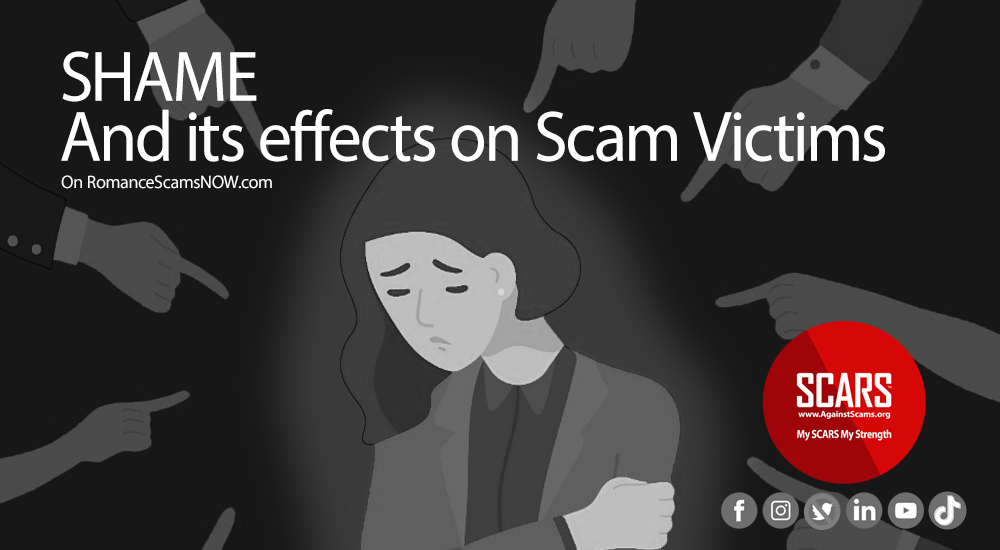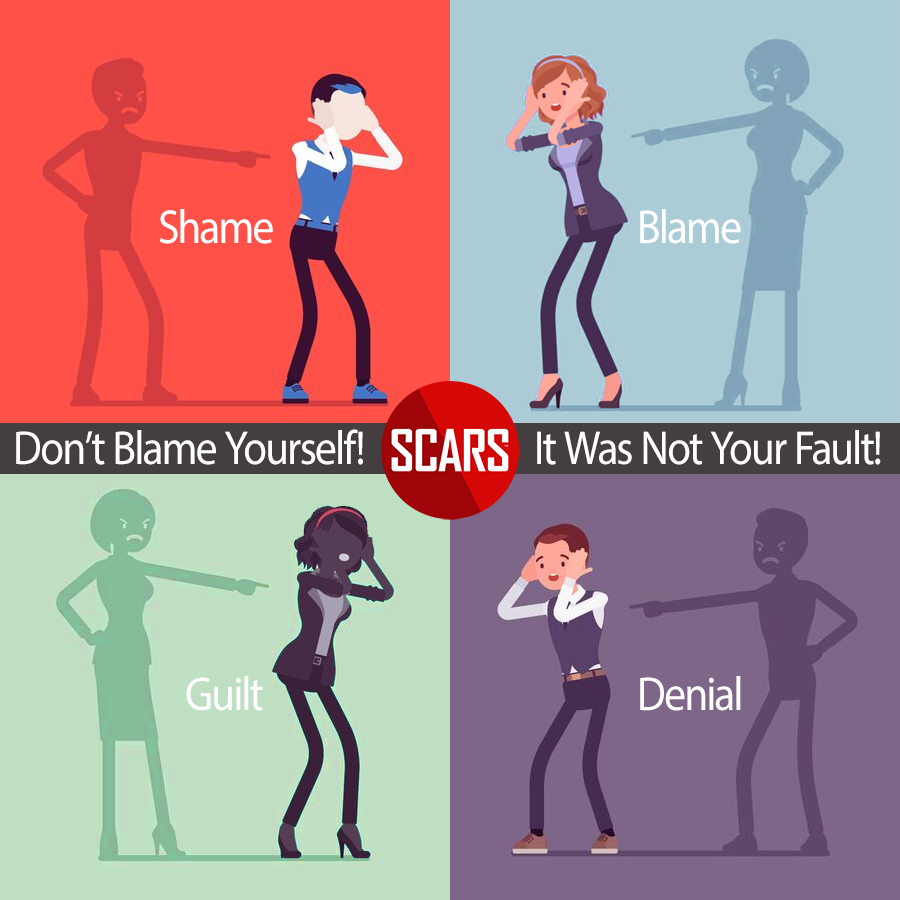No Scam Victim Should Ever Feel Shame, Yet Most Do!
Part of it is the event, part is their failure to act against the scam! Most scam victims never even report the scam or the scammer, instead they living in a partial state of denial while their anger or depression takes control.
You Should Feel No Shame At All!
If you did these things you deserve a pat on the back, you did the right things! Be proud!
- You Ended the Scam/Crime
- You Blocked the Scammer/Criminal
- You Reported the Crime Properly to Your Local & National Police
- You Found Help to Recover
Living With Shame
But if you are living with these, then shame is controlling your life! Stop It and Take Control!
- Are You Denying the Truth?
- Are You Still Talking to the Scammers/Criminals?
- Did You Ever Report the Crime?
- Did You Never Look for Help?
NEVER FEEL SHAME!
DO THE RIGHT THINGS NOW!
Why Do Scam Victims Feel Shame After The Scam Ends?
Scam victims may feel shame after the scam ends for a variety of reasons. Here are some possible explanations:
Scam victims may feel that they were gullible or foolish for falling for the scam. They may believe that they should have been able to recognize the scam and avoid it. This self-blame can lead to feelings of shame and embarrassment.
There is still a stigma attached to being scammed. Victims may worry that others will judge them harshly for having been scammed, viewing them as naive or foolish. This can lead to feelings of shame and a reluctance to share their experience with others.
Scam victims often feel a sense of loss of control over their lives. They may feel that they have been taken advantage of and that they were powerless to prevent it. This loss of control can lead to feelings of shame and vulnerability.
Scams can often lead to significant financial losses, which can be a source of shame for victims. They may feel embarrassed that they were unable to protect their finances or that they have been left in a difficult financial situation.
Scam victims may worry that others will judge them negatively for having been scammed. They may fear that others will see them as vulnerable or as an easy targets for scammers. This fear of judgment can lead to feelings of shame and a reluctance to seek help or support.
It’s important to remember that being scammed is not a reflection of the victim’s intelligence or worth. Scammers are skilled at manipulating people and using tactics to deceive even the most savvy individuals. It’s important for victims to seek support and assistance, rather than feeling ashamed or embarrassed about what has happened.
Feeling Shame If You Have Not Reported The Crime
Scam victims may still feel shame because they have never reported the scam to the police for several reasons:
Because the victim hasn’t reported the scam, they feel that they should have been able to report the crime and help prevent others from becoming victims.
Scam victims may feel shame about how others will perceive them if they reveal that they never reported the crime to their police. They may fear that others will see them as letting the scammers win. This fear of judgment can lead to feelings of shame and embarrassment.
How Can Reporting Scams To The Police And Taking Back Control Help Scam Victims To Avoid Shame And Guilt Over These Crimes?
Reporting scams to the police and taking back control can help scam victims avoid feelings of shame and guilt for several reasons:
Empowerment: By reporting the scam to the police, victims can take back some sense of control and empowerment. It can be a positive step towards actively addressing the situation and taking action against the scammers, rather than feeling helpless and ashamed.
Validating the victim’s experience: Reporting the scam can help victims feel validated and heard. They may feel less alone in their experience and less isolated in their shame or embarrassment.
Raising awareness: Reporting the scam to the authorities can help raise awareness of the scam and prevent others from falling victim to it. By taking action, victims can help prevent others from experiencing the same scam and can prevent the scammers from harming other people.
Accessing support: Reporting the scam can also connect victims with support services that can help them recover from the experience. These services can help victims address their feelings of shame or guilt, provide them with practical assistance, and help them to recover financially and emotionally.
Reporting scams to the police can be an important step toward healing and recovery for scam victims. It can help them to take back control and feel empowered and can provide them with access to the support and resources they need to move forward from the experience.
Learn More:
- 3 Steps For New Victims
- Urgent Next Steps
- Why Reporting Matters?
- What Every Victim Needs To Understand
- Reporting Scams & Interacting With The Police – A Scam Victim’s Checklist [VIDEO]
- Next Steps – Protect Your Financial Identity
- From Victim To Survivor
- Reporting Scams To The United States Secret Service – Cryptocurrency Recovery – Forget The FBI! [VIDEO]
- How To Effectively Follow Up – Scams and the Local Police
- Reporting Scammers – How To Tell Your Story To Your Local Police!
- A Quick Reminder To Report All Scams
-/ 30 /-
What do you think about this?
Please share your thoughts in a comment below!
Do You Need Support?
Get It Now!
SCARS provides the leading Support & Recovery program for relationship scam victims – completely FREE!
Our managed peer support groups allow victims to talk to other survivors and recover in the most experienced environment possible, for as long as they need. Recovery takes as long as it takes – we put no limits on our support!
SCARS is the most trusted support & education provider in the world. Our team is certified in trauma-informed care, grief counseling, and so much more!
To apply to join our groups visit support.AgainstScams.org
We also offer separate support groups for family & friends too.
Become a
SCARS STAR™ Member
SCARS offers memberships in our STAR program, which includes many benefits for a very low annual membership fee!
SCARS STAR Membership benefits include:
- FREE Counseling or Therapy Benefit from our partner BetterHelp.com
- Exclusive members-only content & publications
- Discounts on SCARS Self-Help Books Save
- And more!
To learn more about the SCARS STAR Membership visit membership.AgainstScams.org
To become a SCARS STAR Member right now visit join.AgainstScams.org
To Learn More Also Look At Our Article Catalogs
Scam & Crime Types
More SCARS
- ScamsNOW Magazine – ScamsNOW.com
- ContraEstafas.org
- ScammerPhotos.com
- AnyScam.com – reporting
- AgainstScams.org – SCARS Corporate Website
- SCARS YouTube Video Channel
Statement About Victim Blaming
Some of our articles discuss various aspects of victims. This is both about better understanding victims (the science of victimology) and their behaviors and psychology. This helps us to educate victims/survivors about why these crimes happened and to not blame themselves, better develop recovery programs, and to help victims avoid scams in the future. At times this may sound like blaming the victim, but it does not blame scam victims, we are simply explaining the hows and whys of the experience victims have.
These articles, about the Psychology of Scams or Victim Psychology – meaning that all humans have psychological or cognitive characteristics in common that can either be exploited or work against us – help us all to understand the unique challenges victims face before, during, and after scams, fraud, or cybercrimes. These sometimes talk about some of the vulnerabilities the scammers exploit. Victims rarely have control of them or are even aware of them, until something like a scam happens and then they can learn how their mind works and how to overcome these mechanisms.
Articles like these help victims and others understand these processes and how to help prevent them from being exploited again or to help them recover more easily by understanding their post-scam behaviors. Learn more about the Psychology of Scams at www.ScamPsychology.org














Leave A Comment